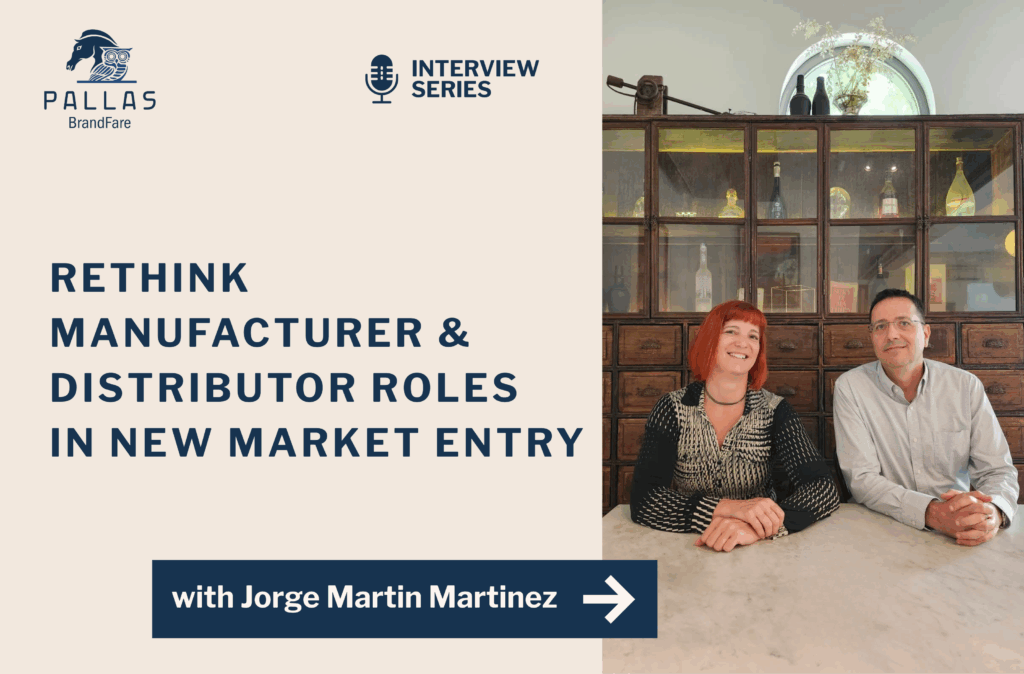In the process of entering new markets, many manufacturers rely on local distributors as the touchpoint for sales and market access. At a certain point, relationships between the manufacturer and the distributor can become vague in terms of responsibilities, esp. in sales, branding and marketing.
Let’s discuss experiences and solutions with Ms. Corinna Seidel, Managing Director PALLAS BrandFare, and Mr. Jorge Martin Martinez, Managing Director Bull Management Consulting, a partner of PALLAS BrandFare providing hands-on advisory services on market entry strategy, both organic (through distributors and/or own set-up) and inorganic (through M&A).
From your experience, what is normally expected from manufacturers in a manufacturer-distributor collaboration?
Corinna: Our projects, especially in Vietnam, have taught us: there’s an expectation from distributors that the manufacturers will invest in building a strong brand instead of simply delivering the product and hoping the distributor will take care of sales. Many distributors expect more support, especially in demand generation, market presence, and visibility.
Jorge: Yes, distributors are typically strong in making the product available on the market. But when it comes to generating demand, their capabilities vary. Some are more advanced and can help create demand, but that requires a lot of investment in both Advertising and Promotion (A&P) and market knowledge.
While A&P needs resources from the manufacturer, knowledge of the market also includes local marketing expertise, like how and where to invest. Especially when launching in a new market, mistakes in marketing can burn a lot of money. Only a few distributors with an adequate team profile offer a “full agency distribution model”, where they take over both sales and marketing functions; but such cases are rare. The majority of distributors focus on the logistics part, including making the product available and taking orders; however, creating demand and marketing is what makes a difference in market success.
“Only a few distributors can offer a full agency distribution model.”
Is the expectation towards manufacturers to build a strong brand normally mentioned in discussions about the contract?
Corinna: In my experience, manufacturers usually come to us when they feel frustrated that distributors don’t do much in terms of brand building or promotion. The tricky part is that from their perspective, distributors often assume it’s the manufacturer’s job, but neither side brings it to the table. It’s not just who should do what, but also how it should be done.
Jorge: Indeed, this happens very often. Most distributors have a sales/logistics team whose job is to place products at points of sale. But if they lack industry-specific marketing knowledge, the manufacturer provides substantial funds in advertising and promotion that may end up not being invested optimally, thus leaving a lot of value on the table. Sometimes manufacturers do not have enough experience in distribution and largely ignore what they need from a distributor and how to incentivize and control it properly.
Understanding whether your partner can help build the brand and actively sell, not just take orders passively, is crucial. Take the healthcare industry as an example: it’s often necessary to go to hospitals and doctors first to build credibility before reaching out to pharmacies or e-commerce. Simply placing products in clinics or pharmacies won’t guarantee sales. Note also that the kind of professionals required to create a healthcare brand in a market are very qualified individuals, including medical doctors and pharmacists. It is often most effective when doctors and pharmacists talk to their counterparts at the hospitals and pharmacies. This is a very high investment for a distributor, very different from a ‘logistics order taking’ distributor only, requiring long-term partnerships and increased fees. This is why marketing and route-to-market planning need to be paid attention to early, ideally before product launch.
“If distributors lack branding and marketing knowledge, funds for advertising may end up not being invested optimally, thus leaving a lot of value on the table.”
What can manufacturers do together with distributors right from the start to assure demand generation?
Corinna: Before doing marketing, both parties should work together on elaborating on the product-market fit and branding approach. Many companies, especially German manufacturers, bring high-quality products into markets like Vietnam, but the relevance for the local market must be proven. This is often overlooked, copy-pasted from Europe, or only considered superficially. It depends on whether there’s a strong product management team at the manufacturer’s side and whether local market expertise is taken seriously.
Jorge: True, even if a product is objectively very good, in markets like Vietnam or Southeast Asia affordability often matters more. Consumers may recognize the very good quality but may not always be willing to pay much more extra for ‘perfection’, i. e. incremental improvements. Therefore, pricing becomes a key product attribute, sometimes even more decisive than high quality.
Where do you stand in this manufacturer-distributor relationship? Let us know your thoughts and explore the next sessions of the interview to see how our speakers describe their experiences further and get their advice for a successful distribution partnership in a new market.
About featured guest speakers
Corinna Seidel is the founder and Managing Director of PALLAS BrandFare, which supports industrial companies, technology providers, and service companies with strategic and targeted operational marketing for market entry and growth between Europe and Asia – from product-market fit through brand building to targeted marketing. Corinna’s focus lies in strategic marketing and business development – from product-price strategy through distribution to cross-media communication – for internationally operating companies. She supports companies as advisor and interim manager.
Jorge Martin Martinez is the founder and Managing Director of Bull Management Consulting. With many years of top management at multinational distribution companies from group level to regions, he has managed and expanded massive distribution networks and built a wide network of business collaboration in market entry strategy, business start-up, buy-side M&A, distributor search, and negotiation.

